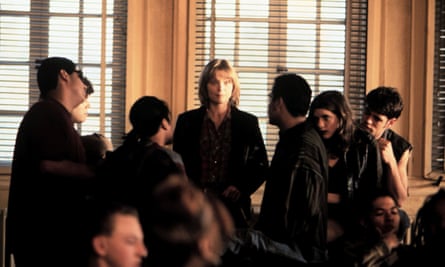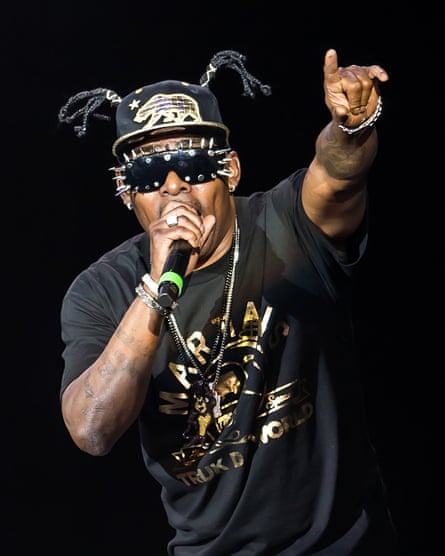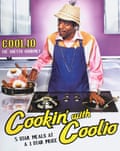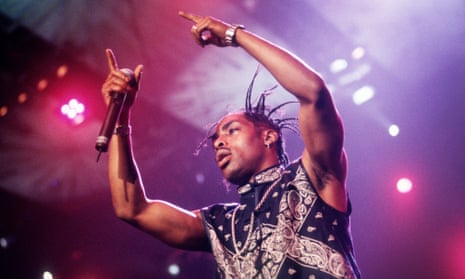Coolio, who has died suddenly aged 59, was an accessible star of the US west coast hip-hop scene whose 1995 single Gangsta’s Paradise became one of the most successful rap songs of all time, topping charts around the world.
Although he had emerged in the late 1980s from the same Los Angeles neighbourhood as the combative hip-hop artists Dr Dre, Eazy-E, Ice Cube and the rest of the NWA crew, Coolio’s subject matter and demeanour were lightweight in comparison with some of his peers. Gangsta’s Paradise, which appeared in the film Dangerous Minds (1995), starring Michelle Pfeiffer, took as its topic the short and brutal existence of the career criminal, but its poppy tones reflected Coolio’s more melodic and playful positioning at the lighter end of rap.
It was a formula that served Coolio well in the late 90s as his first two albums sold millions of copies worldwide. But after five years in the spotlight he fell out of favour as other hip-hop artists came into the mainstream, and for the next three decades he was perhaps better known for his chirpy work in reality TV, gameshows and film.
Coolio’s real name was Artis Ivey. Born in the small town of Monessen, Pennsylvania, to Jackie Slater, a factory worker, and Artis Ivey Sr, a carpenter, at the age of 11 he moved with his mother to Compton, a tough, gang-ridden area of LA.
At high school and then Compton Community College he was a bright pupil, making a name for himself as a rapper on the local scene, where his slick performances earned him the nickname “Coolio Iglesias” after the Spanish singer Julio, later shortened to Coolio. His early work was featured on the Los Angeles hip-hop radio station KDAY and he released his first single, Whatcha Gonna Do?, in 1987, to muted response.
Coolio’s progress was interrupted when he became involved in gang activity, did some jail time as a juvenile offender and developed a crack-cocaine habit. After rehab he emerged determined to refocus, finding new discipline by working first as a volunteer firefighter in the forests of northern California and then as a security guard at Los Angeles airport.
His music career advanced slowly as he moved through his 20s. Another single, You’re Gonna Miss Me, made little impression, and while he was involved for a time with WC and the Maad Circle, guesting on their 1991 debut album, it was not until a couple of years later, having hooked up with the 40 Thevz rap collective, that he came to the attention of the Tommy Boy record label and was offered a recording contract.
The resultant debut album, It Takes a Thief (1994), led to a dramatic turnaround in Coolio’s fortunes as its opening track, Fantastic Voyage, a remake of the funk song by Lakeside, reached No 3 on the US singles chart, aided by a goofily upbeat video that, with the good-time feel of the song, presented a less threatening face of rap to MTV viewers while still addressing serious concerns. The album sold more than 1m copies, reaching No 8 in the US charts.

The following year, Gangsta’s Paradise, which featured the singer LV and was based on Stevie Wonder’s 1976 song Pastime Paradise, threw Coolio into a whole new orbit of popularity, becoming a No 1 hit in the US, the UK, Ireland, France, Germany, Italy, Sweden, Austria, the Netherlands, Norway, Switzerland, Australia and New Zealand. It won the Grammy for best rap solo performance in 1996, whereas the commercially successful film in which it featured – with Pfeiffer playing a hard-nosed teacher in a tough, inner-city area – was critically panned, and so the song became the most memorable aspect of the project.

Although Coolio sang in Gangsta’s Paradise about being 23 and wondering if he would live to be 24, he was by then in his early 30s, and had waited many years for his breakthrough. After its phenomenal success as a triple-platinum single, it became the title track of his second album, which sold more than 2m copies worldwide and also featured the hit songs 1, 2, 3, 4 (Sumpin’ New) and Too Hot.
World tours followed and Hollywood came calling: he wrote Rollin’ With My Homies for the 1995 film Clueless, and the following year provided the theme song to the popular Nickelodeon comedy sitcom Kenan and Kel. He also made his screen debut with a cameo role in the comedy movie Phat Beach.
Coolio’s musical star, though it shone brightly, did not do so for long. His 1997 album, My Soul, contained another hit, yet was a relative damp squib, and with the emergence of new rap stars he was dropped by Tommy Boy. Five more studio albums followed on other labels – from Coolio.com in 2001 to From the Bottom 2 the Top in 2009 – but increasingly it was film and TV work that kept him in the public eye.
Over the years Coolio racked up more than 50 movie credits, many of them bit parts but a fair few in more substantial roles across a tapestry of genres, including as Dion in the mockumentary Hollywood Burn (1997), Luther in the 1998 sci-fi film Judgment Day, Franky in the Croatian drama A Wonderful Night in Split (2004), and a character called The Flow in Three Days to Vegas (2007), a road-trip comedy starring Peter Falk and Rip Torn. He turned down many other roles, for being “bullshit gangsta parts”.
On TV he made regular appearances on American gameshows, including Hollywood Squares, and in reality vehicles such as his own Coolio’s Rules, featuring some of his children. In the UK, he took part in the 2019 series of Celebrity Big Brother, finishing third and joining the cast of Ultimate Big Brother the following year, the last series of the show to air on Channel 4.

A keen golfer and collector of snow globes, by the standards of some hip-hop artists Coolio’s controversy rating was low. While he did have a criminal record, it amounted over the years to little more than two suspended sentences, one for an aggravated theft in Germany (1998) and another for a minor firearm offence in California (2016).
His most recent project was the online Cookin’ With Coolio series, supported by a book and publicised by appearances on various celebrity cooking shows.
In other spheres he was a spokesperson for the US-based Environmental Justice and Climate Change group, and, having suffered from asthma all his life, for the Asthma and Allergy Foundation of America.
He died after collapsing at a friend’s house, from a suspected cardiac arrest, according to his manager.
Coolio had several children, including three daughters and a son from his 1996 marriage to Josefa Salinas, a radio broadcaster, which ended in divorce in 2000.

Comments (…)
Sign in or create your Guardian account to join the discussion